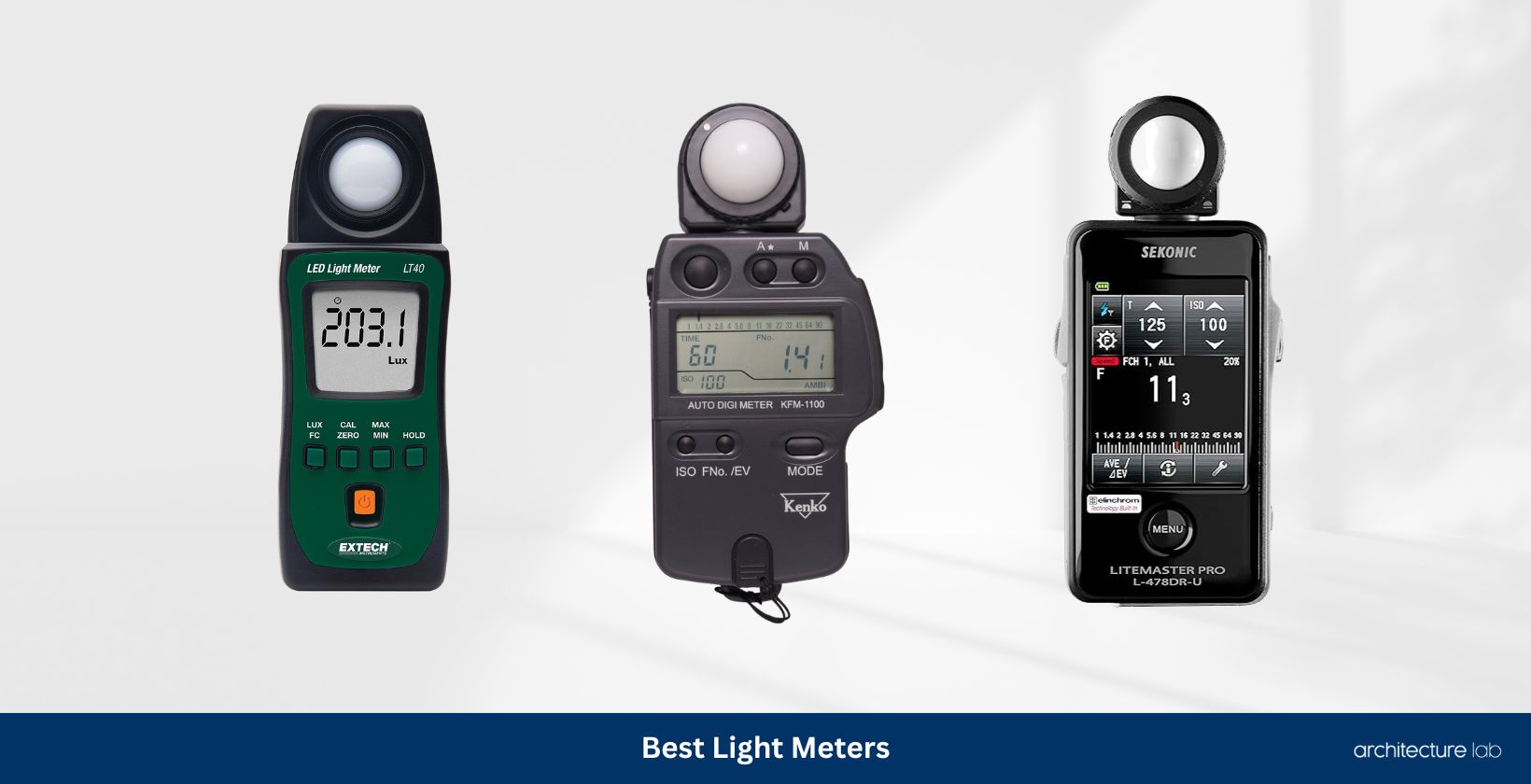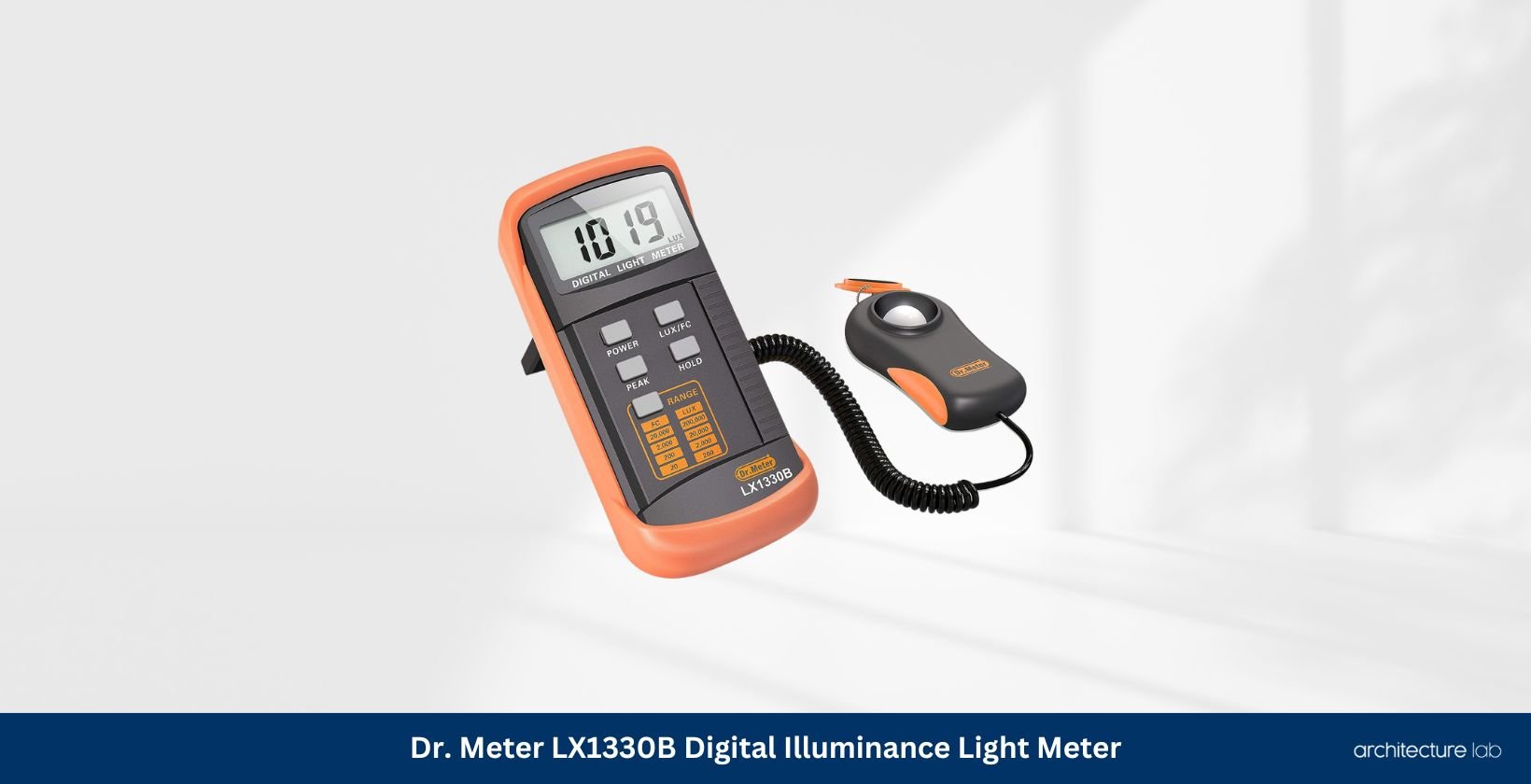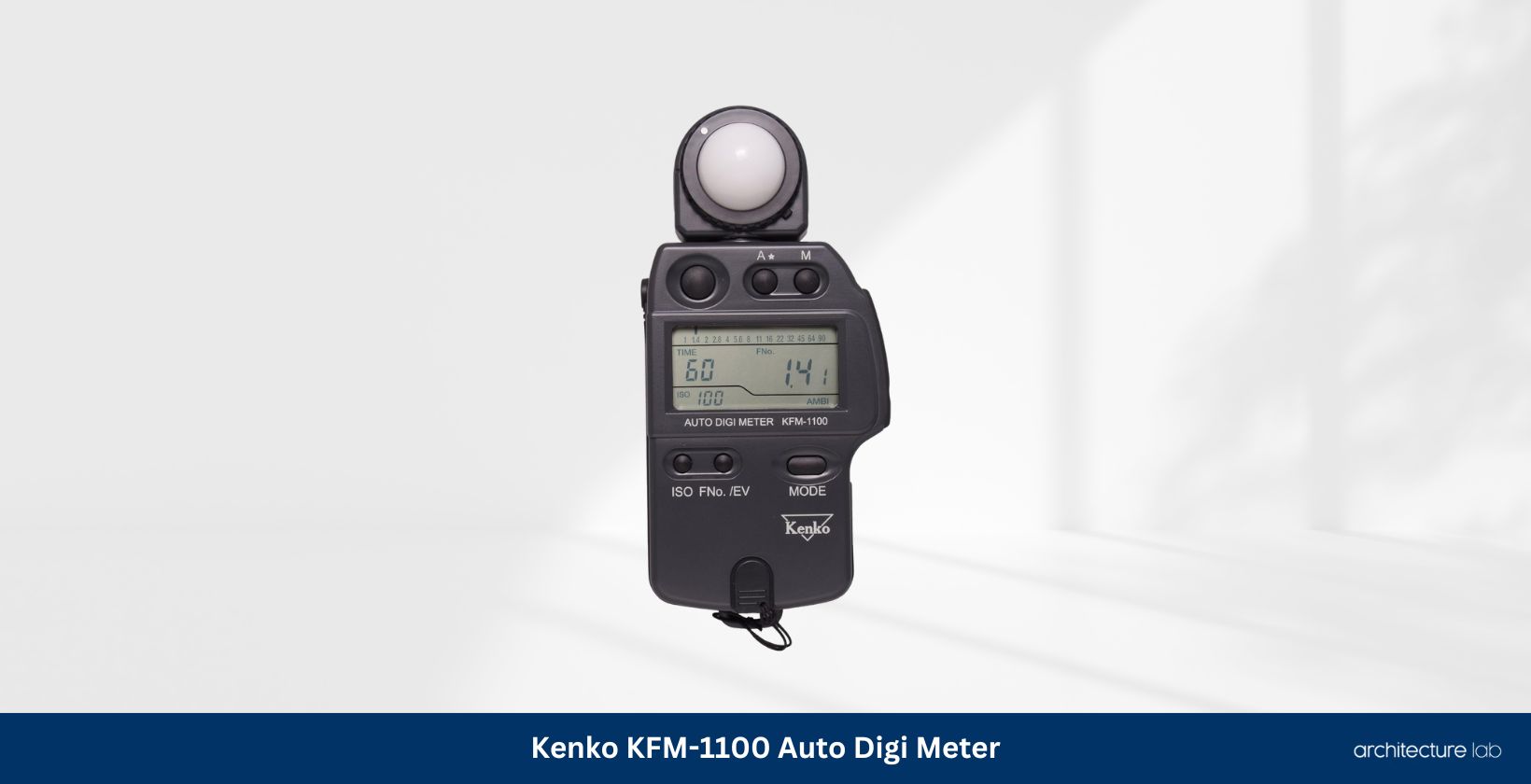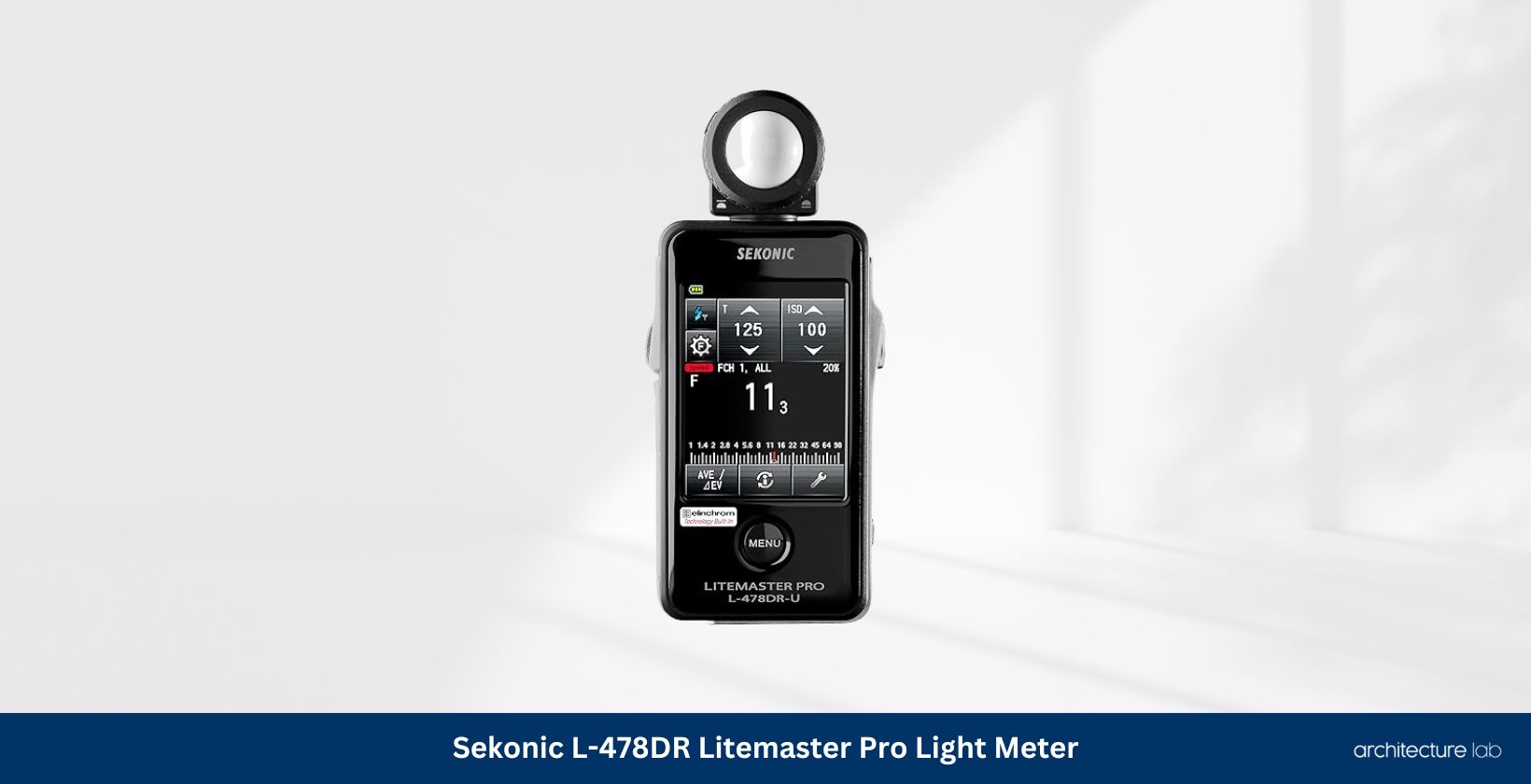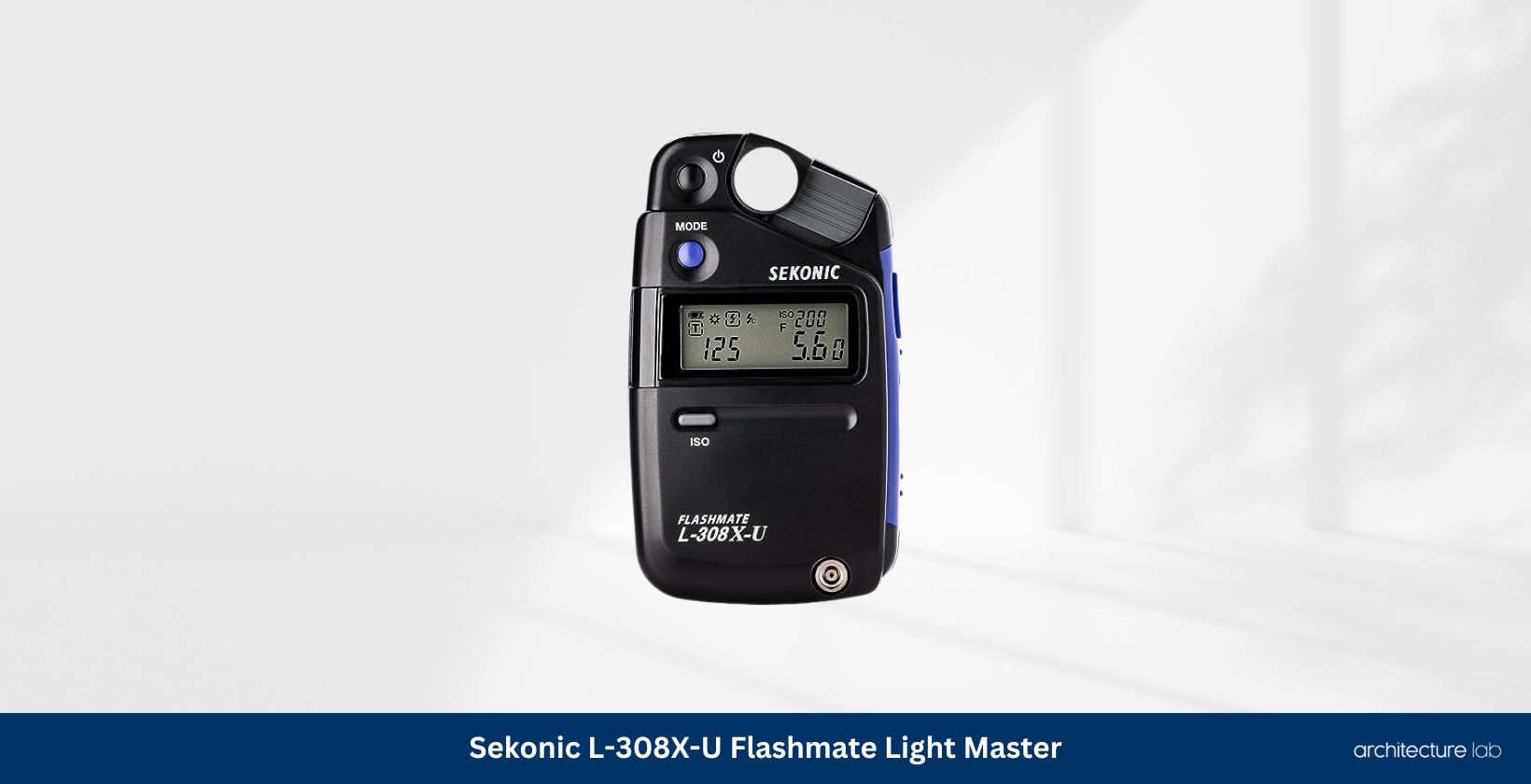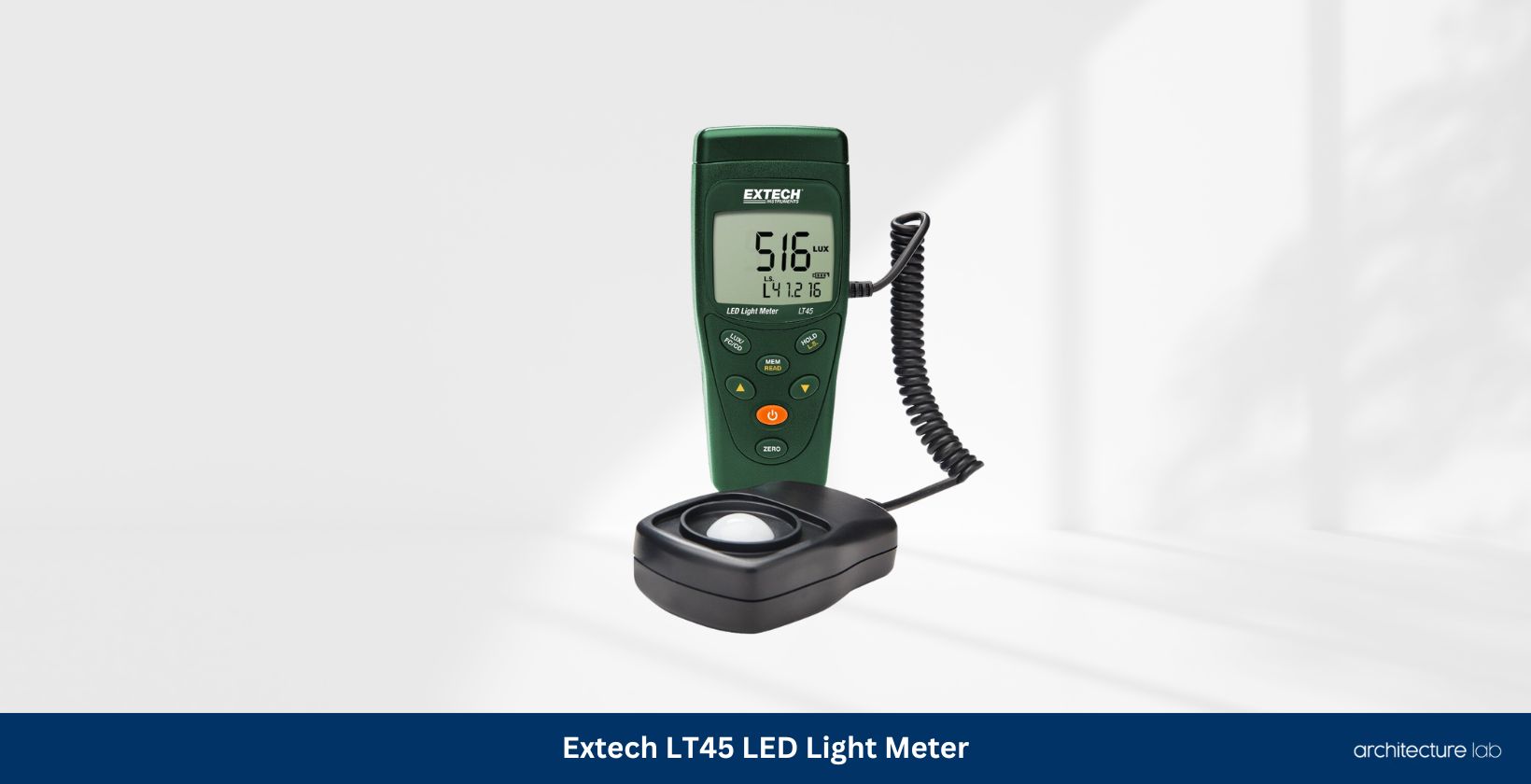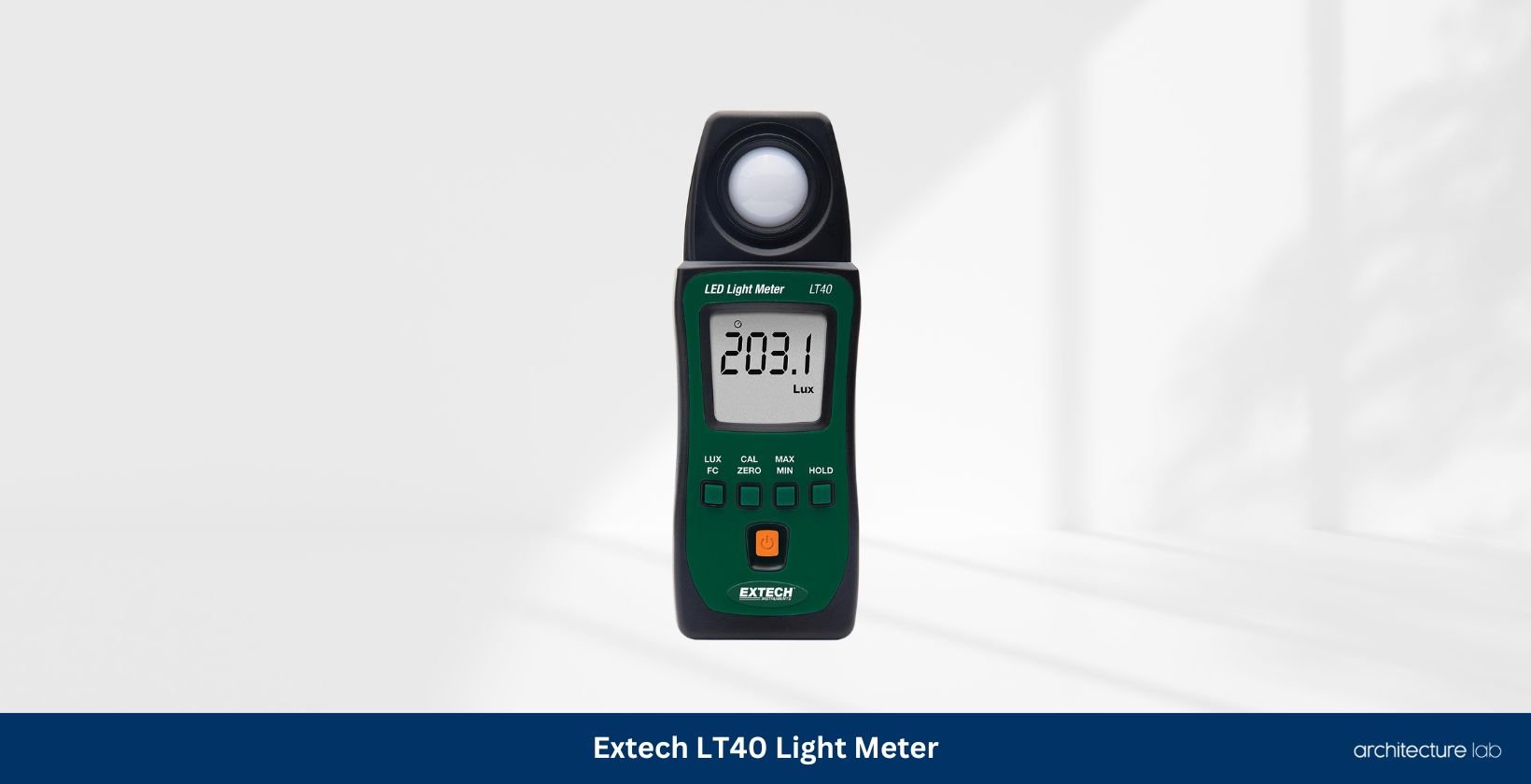If you’re into photography, nobody would understand the role of light better than you. It’s imperative to measure the amount of light accurately to get the proper shot. In these situations, one cannot ask for a better friend than an efficient light meter.
These devices come in very handy in determining the appropriate exposure for a brilliant photograph. However, it’s quite apparent that finding an excellent light meter under a fair budget isn’t as easy as it may sound.
And that’s why we have handpicked some of the best light meters we could find so that you land one that satisfies your needs precisely. Also, go through our buyer’s guide to acknowledge the main factors to consider while buying a light meter.
So, without any further ado, let’s get into it.
Best Light Meters
Here is the list of the 7 best light meters to help you determine the perfect lighting for your photography.
1. GossenDigiPro F2 Light Meter – Best for Lightweight Portability
While speaking of efficient light meters under a bargain-basement price range, the first product that crosses our mind is the Gossen Digipro F2. Now, nobody understands photography and lighting better than Gossen, a global brand that has been in this business since 1933. So, let’s have a more in-depth look at its core features.
First things first, what makes a perfect light meter? Of course, its compatibility. Photography isn’t a desk job, and you’d need to carry around your equipment a lot. Here, the DigiPro F2 aces this criterion with its ultralight weight and compact size.
However, despite its rather compact size, this microprocessor-controlled product offers decent performance that makes it an appropriate option for beginners. For starters, the DigiPro F2 comes packed as an exposure meter that also features a digital LCD and a shutter priority preselection feature. It is also quite efficient at measuring ambient light with an impressive range of accuracy.
Coming to its measurement capabilities, this device packs a corded/non-cord measuring system and two different modes, i.e., incident and reflected light measurement. This way, the DigiPro F2 makes an ideal light meter for both in-studio and outdoor shoots.
Although we aren’t complaining about its capabilities, it frequently needs a lot of spot metering. Moreover, despite being appropriate for beginners, the instructions for this product are not easy to understand at all. This way, it may appear a little difficult to get accustomed to the function of its switches and different modes in the beginning.
What We Like
- Exposure meter with LCD
- Shutter priority preselection
- Decent measurement range
- Two measurement modes
What We Don’t Like
2. Dr. Meter LX1330B Digital Illuminance Light Meter – Best for Budget Buyers
Dr. Meter is a reliable brand when it comes to products that assure you of higher convenience and customer satisfaction. The new LX1330B Digital Illuminance stands out as potential competition to the DigiPro F2 on grounds of accuracy and user-friendliness. For those who cannot afford to spend a fortune on high-quality light meters, this product makes a decent alternative.
This device offers a wide array of features at a very reasonable price, which makes it an appropriate choice for beginner photographers. To begin with, this Dr. Meter device sets the bar higher for metering with its diverse 4-range settings, i.e., 0.1-200/2000/20000/200000 Lux.
Now, due to its wide metering range and its auto zeroing feature, this product offers us readings with sharp accuracy every time. What we liked even more is that it gets the job done in a matter of seconds, with precision.
Furthermore, this device is ultralight and ergonomically designed, which makes it more convenient to carry around and use. To make it even better, numerous buttons on this device allow the user to gain total control over the readings while the info is being recorded.
However, what we believe enhances the portability and convenience of this device, even more, is its low power consumption feature. This way, you don’t have to always worry about charging it too frequently.
After testing this product at numerous events, we’ve found out that this product doesn’t work well with LED lights. Also, the product does not come along with a battery during its delivery, for which it gets a thumbs down from us.
What We Like
- 4-range metering settings
- Auto zeroing feature
- Higher user control
- Low power consumption
What We Don’t Like
3. Kenko KFM-1100 Auto Digi Meter – Best for Flash & Ambient Light
If you’ve been into photography for quite a few years, it’s less likely that you haven’t come across Kenko. This brand is best known for manufacturing some of the best meters and filters in the market for the last 63 years. The Kenko KFM-1100 is one of their most exceptional light meters that has impressed us with its features, and we can’t wait to share our experience with you.
Right as we started to test this product, we found a major common feature that instantly classifies this product as a must-have item. Just like the Gossen DigiPro F2, the Kenko KFM-1100 stands out as an efficient light meter that can read both flash and ambient light with precision.
Unlike Dr. Meter LX1330B, this product has fewer switches, which, however, gives this device a very simple and less confusing user interface. This product also features a wide shutter range of 1/8000 second to 1800 seconds, which makes it quite eligible for professional use.
This product doesn’t require a sync cord to be operated, which enhances its user convenience by a great deal. As a bonus, the KFM-1100 allows us to evaluate the flash and ambient lighting to gain an in-depth understanding of the lighting ratio of a particular scene.
The build material of this device is light plastic, which makes us question its durability. Also, we believe that it’s a little too expensive for a flash meter. Most of its competing brands are usually offering similar features (except a few negligible ones) at a comparatively low price in the market.
What We Like
- Reads both flash and ambient light
- Lighting ratio calculation
- Higher accuracy
- Cord/Cordless feature
What We Don’t Like
4. Sekonic L-478DR Litemaster Pro Light Meter
There’s hardly any other device in the market that assures light measurements as accurate as the Sekonic light meters. The Sekonic L-478DR Litemaster Pro is an ideal option for beginner photographers and filmmakers, as it’s an easy-to-use light meter that also packs numerous astounding features.
Just like the Ikan CV600, this product also offers an advanced touchscreen LCD that enables users to operate it with ease. Although the screen isn’t as large as the CV600, we found it sufficient for smooth operation. However, the L-478DR comes packed with an in-built radio flash control, which gives it an advantage over the CV600.
As a bonus, the device enables triggering for the 2.4 GHz Elinchrom EL Skyport wireless system, which makes measuring incident light a lot simpler. Now coming to its metering capabilities, this product offers a decent measurement range of -2 to 22.9 EV at ISO 100.
To make it even better, the product also features two different videography modes apart from its still functions, such as Cine mode and HD Cine mode. Overall, this unit makes an absolute value-for-money product that everyone must consider.
The most significant disadvantage of this product would be its incompatibility with PocketWizard devices. It’s because, as it’s a Japanese model, it isn’t designed to be compatible with the US radiofrequency. This is a major inconvenience, and we’re hoping Sekonic addresses this issue on urgent notice to make this unit more compatible.
What We Like
- Touchscreen LCD
- In-built radio flash control
- Two videography modes
- Easy to operate
What We Don’t Like
5. Sekonic L-308X-U Flashmate Light Master
Globally leading brand Sekonic bags two consecutive spots in our list with the L-3O8X-U Flashmaster Light Master. It seems that Sekonic truly understands a photographer’s need for being versatile, as the wide set of features offered by this unit proves it. We’ve had the opportunity to have a hands-on experience with this unit, and we’re quite satisfied.
This unit appears to us as stiff competition to the Gossen and Kenko light meters, as it also allows us to measure flash and ambient lighting. Quite frankly, the light sensitivity of this unit is pretty impressive for a meter at this price range.
Now there’s a reason why the L-308X-U makes a perfect option for beginner photographers who still haven’t had their hands on an independent meter before. It’s because this unit boasts the utmost accuracy and offers one of the simplest user interfaces in the market.
What comes next is its versatility, which is unarguably the USP of this model. Simply put, this device provides three different modes for metering, such as still photography mode and Cine /HD Cine mode for videography.
We were hoping that just like the L-478DR, this unit will also feature numerous advanced and fancy features, such as a touchscreen LCD. However, we understand that due to its low price, Sekonic has cut down on many additional features. Furthermore, we’ve noticed that the device doesn’t come along with a Lumidisc attachment, which is a tad upsetting.
What We Like
- Very user-friendly
- Compact and ultralight
- Quite versatile
- Appropriate for beginners
What We Don’t Like
6. Extech LT45 LED Light Meter
Extech is a popular name in the Test and Measurement tools industry that has been catering to professional photographers since 1971. The Extech LT45 LED light meter appears to us as an astounding innovation that takes light metering to another level with its groundbreaking features.
In terms of versatility, this product gives fierce competition to the Sekonic L-308X-U unit. It’s because the LT45 allows us to measure numerous sources of standard light, such as incandescent, fluorescent, metal halide, and high-pressure sodium, apart from color LED lighting.
Coming to its display, its full LCD comes with additional features such as auto shutdown, overload notification, and data holding. Moreover, this meter also shows luminous intensity with precision.
Just like the Gossen GO, this product also shows measurements in both FC and lux units, which can be changed with a single click. Overall, it delivers an absolute power-packed performance at a fair price.
Although this product stands the test of time with its cutting-edge features, it thumbs its nose at elementary criteria. To be precise, we’ve noticed that this product isn’t compatible with third-party calibration, which lowers its efficiency by a great deal.
What We Like
- Numerous standard light measurement modes
- Auto shutdow
- Luminous intensity mode
- Ergonomic design
What We Don’t Like
7. Extech LT40 Light Meter
After testing the semi-professional Extech LT45 light meter, we were pretty eager to have our hands on its low-priced alternate version, the LT40 light meter. Although this unit isn’t the best light when it comes to outdoor shoots, it is quite efficient at measuring indoor lights.
We were searching for a low-budget light meter that offers decent performance at measuring the light levels of in-studio environments when we came across the Extech LT40. To our surprise, this product stands out to be pretty impressive at analyzing and monitoring indoor light levels.
The LT40 isn’t any less than the LT45 when it comes to the versatility of light measurements. It can also measure fluorescent, incandescent, sodium, high-pressure, and metal halide light sources. As a bonus, its push-button feature also allows you to set and operate this gadget quickly.
Coming to its additional features, the LT40 also has an automatic shutdown feature that helps in conserving power. And, this product also displays both FC and lux units for measurement.
Just like the LT45, this product also does not support 3rd party calibration. We hope that Extech takes note of this significant issue ASAP so that the users do not face this problem any further. Furthermore, we’ve noticed a lot of customers complaining about its unsatisfactory accuracy, which also lowers its value in the market.
What We Like
- Several modes of measurement
- Automatic shutdown
- Fc and lux measurement unit
- Easy to operate
What We Don’t Like
Best Light Meter Comparison Table
| Product | Product Dimensions | Weight | Operating Temperature (°F) | Warranty |
|---|---|---|---|---|
| GossenDigiPro F2 | 0.75″ x 2.56″ x 4.65″ | 3.2oz | 14°F – 122°F | 2 Years |
| Dr. Meter LX1330B Digital Illuminance | 4″ x 1″ x 8″ | 1lb | 32°F – 104°F | 1 Year |
| Kenko KFM-1100 Auto Digi Meter | 5.75″ x 2.75″ x 1.13″ | 5.6oz | 14°F – 122°F | N/A |
| Sekonic L-478DR Litemaster Pro | 8.26″ x 5.82″ x 1.96″ | 4.94oz | 14°F – 122°F | 3 Years |
| Sekonic L-308X-U Flashmate Light Master | 4.3″ x 2.5″ x 0.9″ | 3.52oz | 32°F – 104°F | N/A |
| Extech LT45 | 5.3″ x 1.9″ x 0.2″ | 1lb | 41°F – 104°F | 2 Years |
| Extech LT40 | 5.3″ x 1.9″ x 0.2″ | 4.94oz | 41°F – 104°F | 2 Years |
Buying Guide For The Best Light Meter
As it appears, you’re already aware of the 7 best light meters in the market right now. However, you still need to choose which one is the best for you, among these products. But, how will you make this decision?
Don’t worry; we have included exclusive buyer’s guide for you to acknowledge the different factors that altogether make a perfect light meter. And that’s why we’ve listed the various features that you must evaluate before you decide upon a single product.
In-camera/Handheld feature
First things first, are you looking for an in-camera exposure meter or a handheld meter? The in-camera systems are not quite efficient at taking incident/flash readings. These are good enough for tasks that do not require high accuracy. Nonetheless, handheld meters are additional accessories that guarantee you a higher range of accuracy.
Incident metering
While you’re taking a still picture, incident light measuring is essential as it determines the amount of light that’s falling upon the key subject. These may not be as useful for those who are filming, as the item will be moving continuously.
Spot metering
If you’re going for a handheld meter, the first thing you must check is whether it’s efficient at spot metering. Spot metering is vital in maintaining the balance between the subject and the background, which plays a significant role in photography.
Flash metering
As we all know, camera flashes are as quick as 1/1000th fraction of a second. Maintaining proper light balance during such a swift instance is very important in still photography. So if you’re buying a light meter, you’ve to make sure that it’s quite efficient at flash metering.
What are the features of a good light meter?
A good light meter should have features such as the ability to measure both incident and reflected light, an LCD display for reviewing measurements, and a range of settings that can be adjusted for a variety of lighting conditions.
How do I use a light meter?
To use a light meter, first set the ISO, aperture, and shutter speed settings as desired. Then point the light meter at the subject or scene and press the button to measure the light.
Finally, adjust the exposure settings based on the light meter’s reading.
What accessories are needed for a light meter?
Accessories that may be necessary for a light meter include a light meter case for storage and protection, a light meter stand for hands-free use, and a light meter dome for more accurate measurements in difficult lighting conditions.
Conclusion
As we reach the end of our comprehensive analysis and comparison of the best light meters available in the market, it’s time to pick the top three products that stand out based on different factors.
From the above 7 best light meters, here are the top three expert recommendations:
For those seeking a lightweight and compact light meter with decent performance suitable for beginners, the GossenDigiPro F2 Light Meter is an ideal option. Boasting exposure metering features and the ability to measure both incidents and reflected light, this light meter is perfect for both in-studio and outdoor shoots.
If you have a limited budget, the Dr. Meter LX1330B Digital Illuminance Light Meter is a good option. Offering a wide range of features at a reasonable price, this light meter boasts 4-range metering settings for accuracy, auto zeroing, and low power consumption, making it suitable for beginner photographers.
Lastly, for photographers wanting a light meter that can read both flash and ambient light with precision, the Kenko KFM-1100 Auto Digi Meter is the right choice. It features a simple user interface, a wide shutter range, and is cordless, which enhances its user convenience.
Have you used any of these products before? If yes, then do not forget to share your experience with us in the comments below.
That being said, we’ll take your leave for now. Stay tuned for more!
Related Articles
8 Best Softboxes for Speedlight
13 Best Light Meters on the Market Today | Buyer’s Guide
The 10 Best Cameras for Photographing Artwork Right Now
Simply the Best Drones for Architectural Photography
4 of the Best Large Format Printers for Photographers Today
7 Best Tripods for Macro Photography
The 10 Best Cameras for Photographing Artwork Right Now
5 of the Best Tripods for Real Estate Architectural Photography



